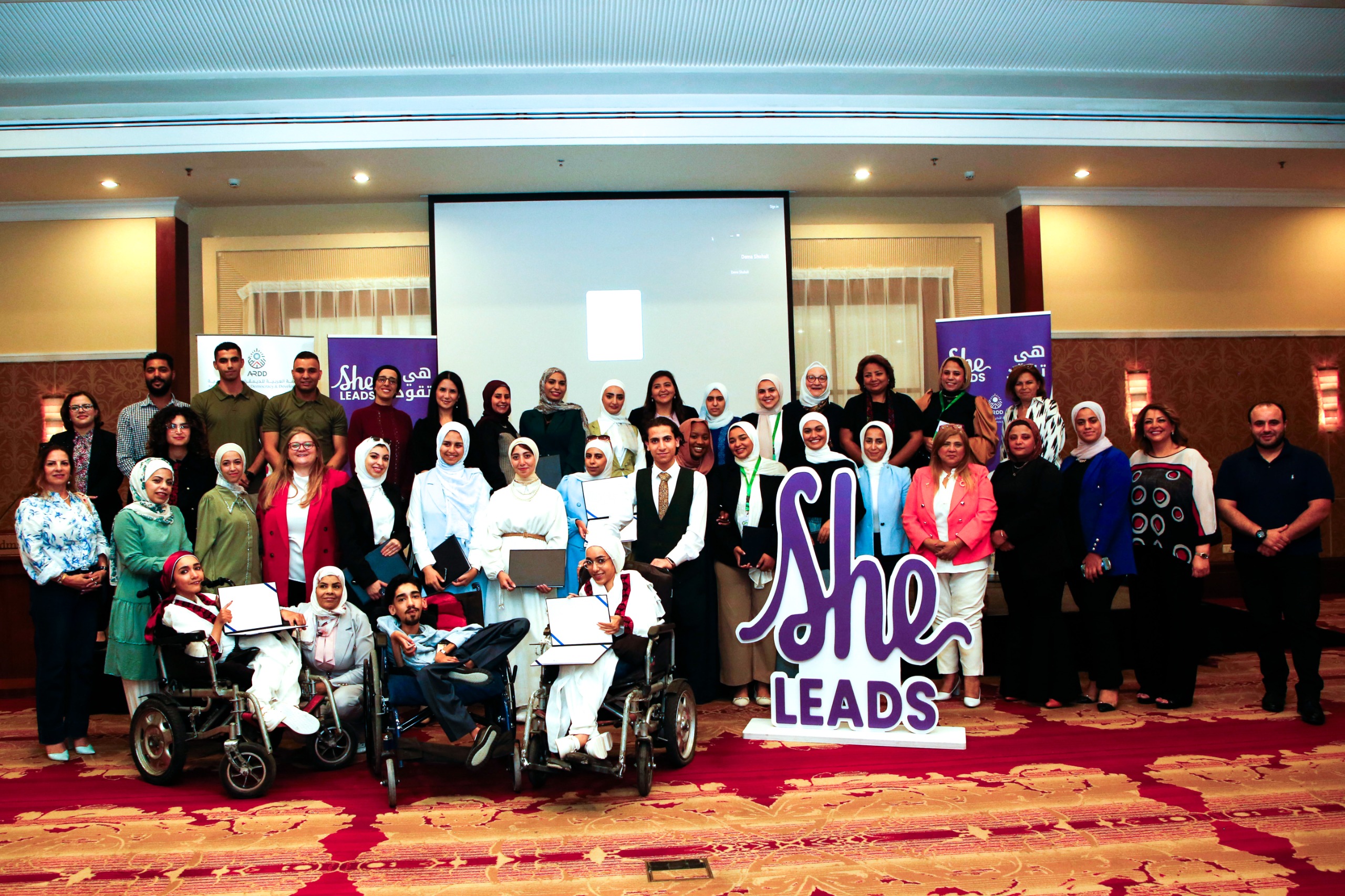“With the conclusion of the She Leads project, the program has been for me an opportunity to learn leadership, to listen to inspiring voices, and to make a real difference in my life and the lives of those around me.” With these words, Sally Saleh, one of the participants in She Leads, opened the final event of the project, held on Monday, August 25, 2025, titled “Celebrating Voices, Inspiring Futures.”
She explained that the project, launched in 2021, was designed as a platform to empower girls and young women in Jordan, Egypt, and Lebanon by enhancing their capacities in advocacy, leadership, and building skills. Throughout its implementation, both partners and participants played a pivotal role in strengthening and supporting young women’s leadership.
The Arab Renaissance for Democracy and Development (ARDD) concluded the program’s activities with a closing event attended by representatives of local and regional organizations alongside young women from the three countries, marking five years of joint work supported by Terre des Hommes.
Lina Halaseh, the project manager at ARDD, emphasized that She Leads was not just a training program, but rather a space for shaping a future led by young women. “Change begins with a bold step, and women’s voices can open the way for all,” she said, noting that the program enabled young women to develop leadership and advocacy skills and to launch initiatives through extensive local and regional partnerships.
Farah Ishaqat, Regional Justice Coordinator at Terre des Hommes, highlighted that “believing in the justice of young men and women does not merely grant them space for expression, but also unleashes their potential to bring about real change that serves their communities.”
Sarah Halawani, Regional and Country Coordinator of She Leads at Plan International, stressed that cross-border partnerships gave young women stronger influence and opened new spaces for communication and bridge building across the region. She also underlined the importance of the research and studies developed by ARDD, which contribute to shaping a supportive environment for youth leadership.
The event also featured video testimonies from participants in Egypt and Jordan, including Alaa Ahmed Gharib (Giza), Menna Allah Mohamed (Assiut), and Salsabila Al-Saud (Amman), who spoke about the impact She Leads had on their lives and community engagement.
The first panel, titled “Empowerment in Practice: Perspectives of Local Civil Society Organizations on Youth Leadership and Its Social Impact,” explored experiences of civil society organizations in supporting young women. Dr. Ruba Matarneh, Secretary General of the Jordanian National Commission for Women, said, “Peer-to-peer influence was one of the program’s greatest successes, as participants transferred their knowledge and experience to peers in their communities, raising awareness and creating tangible impact through their initiatives.”
Hiba Adel, Chairwoman of the Egyptian Female Lawyers Initiative for Women’s Rights, emphasized the importance of developing advocacy activities with girls themselves, as they are best able to design initiatives that align with the reality of their communities and directly and effectively meet the needs of their peers. True empowerment is achieved through practical experience and direct action, rather than through theory.
Reem Mamdouh, Giving Without Limits Association from Assiut, explained how the project strengthened institutional capacities by engaging young leaders more extensively in advocacy activities.
Dr. Mohamed Al-Jarabea, Director of Al-Thoria Studies Center, who moderated the session, stressed that sustainability remains the greatest challenge, calling for empowerment initiatives to shift from short-term activities to long-term pathways.
The second panel, entitled “From Voices to Visions: Reflections on Leadership, Advocacy, and Empowerment,” featured four young women who shared personal reflections. Suad Mansour (Assiut) spoke about the challenges of early marriage and how the project helped her break stereotypes about girls’ roles in her community. Dhikra Al-Hayek (Amman) noted that leadership is not a position or title but “a collective responsibility that begins with self-belief”. While Sundus Saleh (Amman) said her participation changed how she views herself and her future, giving her confidence that her voice carries value. Menna Nabil (Giza) described the program as “a turning point to discover hidden potential and express ideas with confidence,” affirming that leadership is not tied to age or status but to belief in oneself.
Participants collectively emphasized the need to strengthen the role of media in raising awareness of women’s and young women’s issues, highlighting their achievements, and integrating artificial intelligence into social and development work as a critical tool for progress and innovative solutions. They called for converting empowerment initiatives from temporary projects into sustainable pathways that ensure continuous support for young women and the investment of their skills across all stages of life.
They also stressed the importance of cooperation between local and regional organizations to create shared platforms that amplify young women’s voices, expand their influence, and enable them to actively participate in public life and shape policies affecting their communities.
In her closing remarks, Samar Muhareb, Executive Director of ARDD, thanked all partners and donors, affirming that “the journey of She Leads is an inspiring beginning for serving our communities and countries” She added that the impact left in the lives of hundreds of young women proves that investing in the capacities of women and girls is the cornerstone of building a more just and prosperous future for the region.



